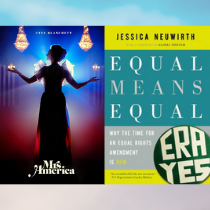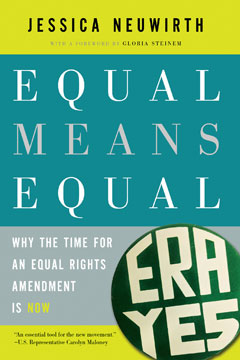"Mrs. America," Equal Means Equal, and the Fight for an ERA

The much-talked-about Hulu miniseries Mrs. America wrapped up last month, and while the show has received some rave reviews, it has also been met with some questions about its accuracy. The show takes place in the 1970s, with an all-star cast playing a number of iconic women through the campaigns both for and against ratifying the Equal Rights Amendment (ERA).
"The series makes it seem as if women are our own worst enemies, which keeps us from recognizing who our worst enemies are."
The New Press published a book in 2015 on the ERA, Equal Means Equal by Jessica Neuwirth, which may appeal to viewers of the show seeking additional context. This smart and accessible primer takes a look at several key areas of sex discrimination that inform the need for an ERA, arguing for making another push towards its ratification in our present moment. With the combined wisdom and experience of the older generations of feminists and the social media presence and expanded intersectionality of newer feminism, Neuwirth argues, now may be the best time to revisit the ERA.

Gloria Steinem, who wrote the foreword for Equal Means Equal and is portrayed by Rose Byrne in Mrs. America, recently shared her opinion of the show in an interview with Laura Bates for the Hay festival. She calls the series “not very good,” with her central critique being the way in which it portrays other woman as the biggest obstacle to the movement. “The series makes it seem as if women are our own worst enemies,” she tells Bates, “which keeps us from recognizing who our worst enemies are. Not that we aren’t in conflict, yes we are in conflict, but by and large we don’t have the power to be our own worst enemies.” According to Steinem, 90% of women today support the ERA, though we are hardly closer to ratifying it.
"Once you read it, I think you, too, will see the ERA as crucial to Americans of all races and economic groups. It’s about time.”
Mrs. America, despite its shortcomings, is drawing attention to the movement again, and perhaps this momentum can be capitalized on. Whether or not you enjoyed the series—or even if you haven’t watched it at all—Equal Means Equal is an excellent book to read parallel to the show, further educate yourself, and consider the opportunity to fight, again, for an Equal Rights Amendment. As Steinem writes in the book’s foreword, “Equal Means Equal explains in a clear and compelling way why the Equal Rights Amendment continues to be needed. It tells you in practical terms how it could be used to create more equality and justice in the daily lives of millions of Americans, both women and men. Once you read it, I think you, too, will see the ERA as crucial to Americans of all races and economic groups. It’s about time.”
